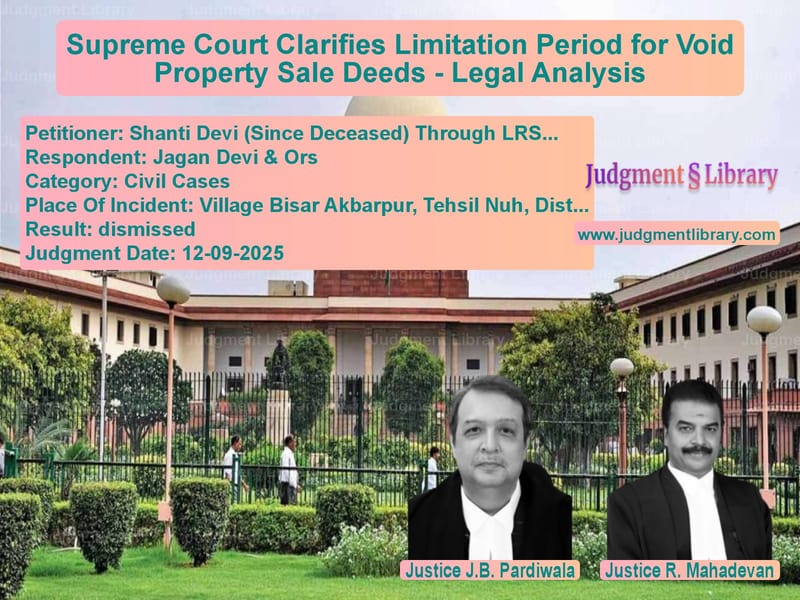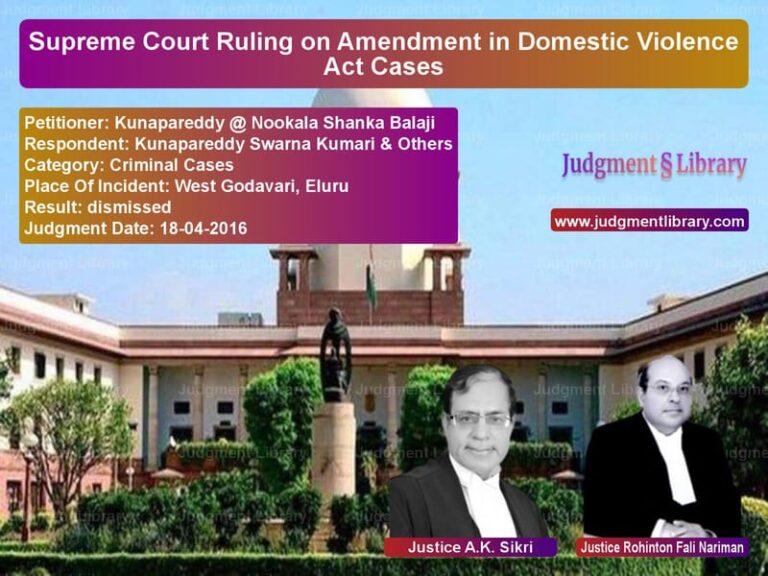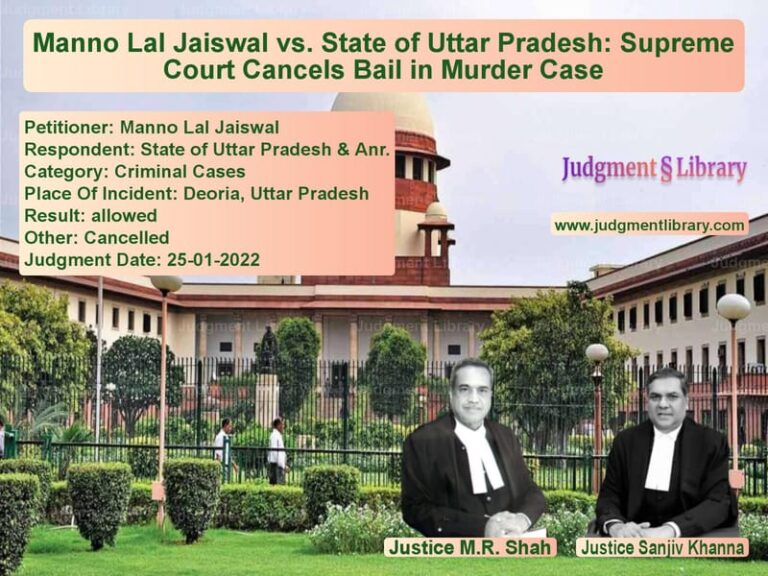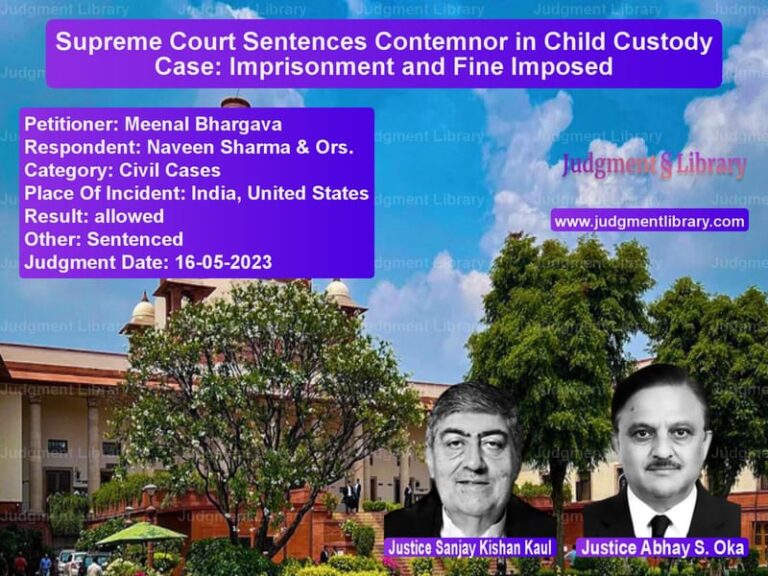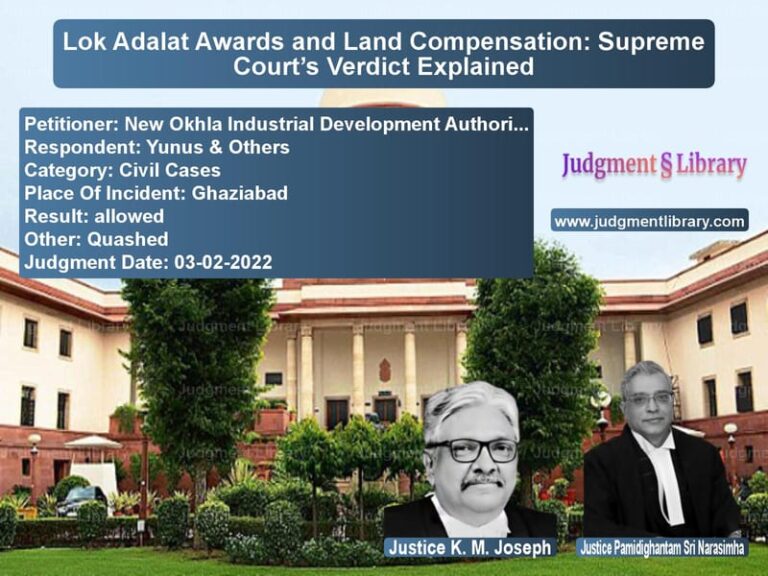Supreme Court Clarifies Limitation Period for Void Property Sale Deeds – Legal Analysis
In a significant judgment that clarifies the complex legal landscape surrounding limitation periods for challenging fraudulent property transactions, the Supreme Court of India recently delivered a landmark verdict that has far-reaching implications for property disputes across the country. The case involved a decades-long legal battle over agricultural land in Gurgaon district, where the core issue revolved around whether a suit challenging a allegedly fraudulent sale deed was filed within the permissible limitation period.
The legal dispute began when the plaintiffs instituted Civil Suit No. 782 of 1984 in the court of Senior Sub Judge, Gurgaon, seeking permanent injunction restraining the defendant from interfering with their peaceful possession of one-third share in agricultural land measuring 31 kanals 4 marlas situated in village Bisar Akbarpur. The plaintiffs alleged that the sale deed dated June 14, 1973, was fraudulent and concocted, and they had never executed it in favor of the defendant.
The Core Legal Dispute
The plaintiffs’ case was straightforward: “the plaintiff never executed on registered sale deed dated 14.6.73 or of any other date in favor of the defendant and she is still the co-owner in possession to the extent of her share in the land.” They further alleged that “the defendant must have got executed and registered the alleged sale deed in her favor by making some impersonation in collusion with the other vendor and witnesses and must have played a fraud on the Sub-Registrar to derive wrongful gain for her personal benefit.”
Most importantly, the plaintiffs asserted that “the plaintiff never got any sale consideration of the alleged sale deed and she came to know about this fraudulent transaction only when he came to the village mourn the death of Ram Saran and heard that her land is going to be sold by the defendant without any right in it.”
The defendant, on the other hand, vehemently denied these allegations, stating that “the plaintiff alongwith the brother Ram Saran sold the land in dispute in favour of the defendant vide sale deed dated 14.6.1973 for sale consideration of Rs.15000/-.” The defendant maintained that “the contents of the sale deed were read over and explained to the plaintiff. She had appeared before the Sub Registrar and had admitted and acknowledged the contents of the sale deed.”
The Journey Through Courts
The Trial Court initially dismissed the suit, but the First Appellate Court reversed this decision and decreed the suit in favor of the plaintiffs. On the crucial question of limitation, the First Appellate Court observed that “the plaintiff could have maintained action to obtain possession of the property within the period of 12 years from the date of knowledge. So even if the knowledge party is ignored still the suit has been filed within 12 years from the date of sale and the same is maintainable.”
When the matter reached the High Court through a second appeal, the Court dismissed the appeal but took a different view on the limitation aspect, holding that “limitation would not come in the way of the plaintiff-respondents, for, the suit can be filed from the date of the knowledge as per the provisions of Article 59 of the Limitation Act.”
The Supreme Court’s Legal Analysis
The Supreme Court bench comprising Justices J.B. Pardiwala and R. Mahadevan conducted a comprehensive analysis of the legal principles governing limitation periods for void and voidable instruments. The Court examined whether Article 59 or Article 65 of the Limitation Act, 1963 would apply to the facts of the case.
The Court made a crucial distinction between void and voidable transactions, noting that “Article 59 of the Limitation Act applies specially when a relief is claimed on the ground of fraud or mistake. It only encompasses within its fold fraudulent transactions which are voidable transactions.”
The Court elaborated on this distinction, stating that “When a document is valid, no question arises of its cancellation. When a document is void ab initio, a decree for setting aside the same would not be necessary as the same is non est in the eye of the law, as it would be a nullity.”
The Court further clarified that “Article 59 would be attracted when coercion, undue influence, misappropriation or fraud which the plaintiff asserts is required to be proved. Article 59 would apply to the case of such instruments. It would, therefore, apply where a document is prima facie valid. It would not apply only to instruments which are presumptively invalid.”
Void vs Voidable Transactions
The Court drew a fine distinction that became central to its decision: “The legal position will be different if there is a fraudulent misrepresentation not merely as to the contents of the document but as to its character. The authorities make a clear distinction between fraudulent misrepresentation as to the character of the document and fraudulent misrepresentation as to the contents thereof. With reference to the former, it has been held that the transaction is void, while in the case of the latter, it is merely voidable.”
In the present case, both the First Appellate Court and the High Court had arrived at the finding that the plaintiff had never executed the sale deed in the first place. The Court noted that “this finding goes to the character of the sale deed and thereby, renders it void/void ab initio. Hence, as per this decision, there remained no reason for the plaintiff to seek for its cancellation.”
The Importance of Sale Consideration
The Court also examined the aspect of sale consideration, noting that “a sale of an immovable property has to be for a price. The price may be payable in future. It may be partly paid and the remaining part can be made payable in the future. The payment of price is an essential part of a sale covered by Section 54 of the TP Act. If a sale deed in respect of an immovable property is executed without payment of price and if it does not provide for the payment of price at a future date, it is not a sale at all in the eye of the law. It is of no legal effect. Therefore, such a sale will be void.”
In the present case, the plaintiff had specifically averred that she never received any sale consideration. The Court noted that “no evidence was adduced by the defendant to prove that even the initial amount of Rs. 9,000/- which was purportedly paid before the execution of the sale deed was actually received by the plaintiff. Therefore, the averment of the plaintiff in the plaint, that she had not received the sale consideration, had not been otherwise proven as false.”
Final Ruling and Legal Principles
After thorough analysis, the Supreme Court concluded that “the High Court could be said to have committed an error insofar as observing that it is Article 59 and not Article 65 of the Schedule to the Limitation Act, 1963, which would apply to the case in hand.” However, the Court ultimately dismissed the appeal, finding that “irrespective of the question of which Article of the Limitation Act, 1963 would be applicable to the suit instituted by the present plaintiff, the suit could be said to have been filed within limitation.”
The Court summarized the legal position by stating that “when the character of the sale deed is assailed as being fraudulent, this requirement is implicitly satisfied since the very averment that the sale deed was fraudulent or a sham and bogus transaction by itself indicates that the plaintiff did not intend to be bound by it.”
This judgment provides crucial clarity on the distinction between void and voidable instruments and the corresponding limitation periods applicable to each. It reinforces that when a transaction is void ab initio – such as when a sale deed is executed without the actual participation of the owner or without payment of consideration – the plaintiff is not required to seek its cancellation within the three-year period under Article 59. Instead, such suits are governed by Article 65, which provides a twelve-year limitation period for possession based on title from the date when the defendant’s possession becomes adverse to the plaintiff.
The Supreme Court’s decision serves as an important reminder of the fundamental principles of property law and limitation, ensuring that genuine owners are not deprived of their property rights due to technical limitations when the underlying transaction is fundamentally void and non-existent in the eyes of law.
Petitioner Name: Shanti Devi (Since Deceased) Through LRS. Goran.Respondent Name: Jagan Devi & Ors.Judgment By: Justice J.B. Pardiwala, Justice R. Mahadevan.Place Of Incident: Village Bisar Akbarpur, Tehsil Nuh, District Gurgaon.Judgment Date: 12-09-2025.Result: dismissed.
Don’t miss out on the full details! Download the complete judgment in PDF format below and gain valuable insights instantly!
Download Judgment: shanti-devi-(since-d-vs-jagan-devi-&-ors-supreme-court-of-india-judgment-dated-12-09-2025.pdf
Directly Download Judgment: Directly download this Judgment
See all petitions in Property Disputes
See all petitions in Contract Disputes
See all petitions in Succession and Wills
See all petitions in Judgment by J.B. Pardiwala
See all petitions in Judgment by R. Mahadevan
See all petitions in dismissed
See all petitions in supreme court of India judgments September 2025
See all petitions in 2025 judgments
See all posts in Civil Cases Category
See all allowed petitions in Civil Cases Category
See all Dismissed petitions in Civil Cases Category
See all partially allowed petitions in Civil Cases Category

